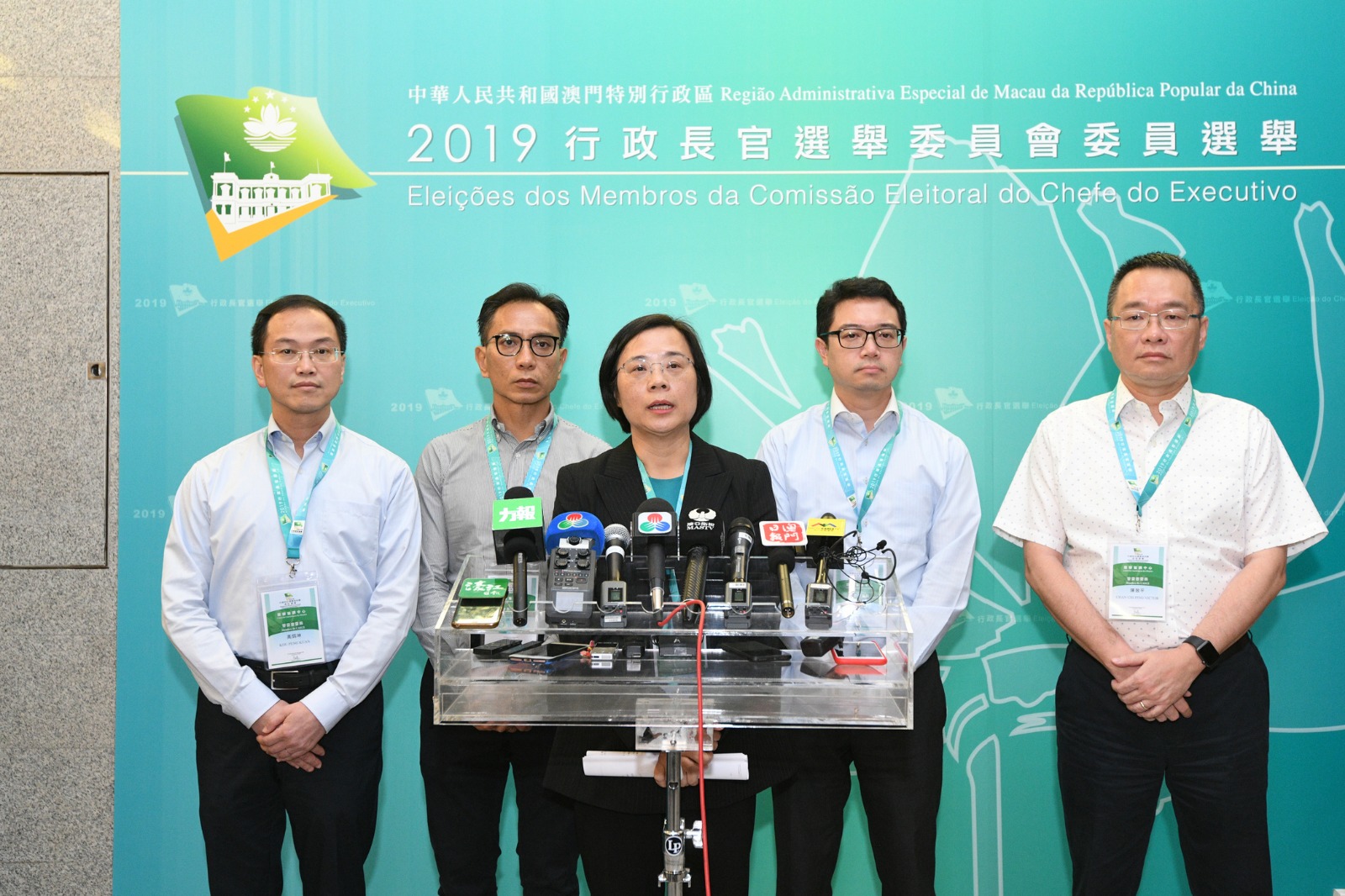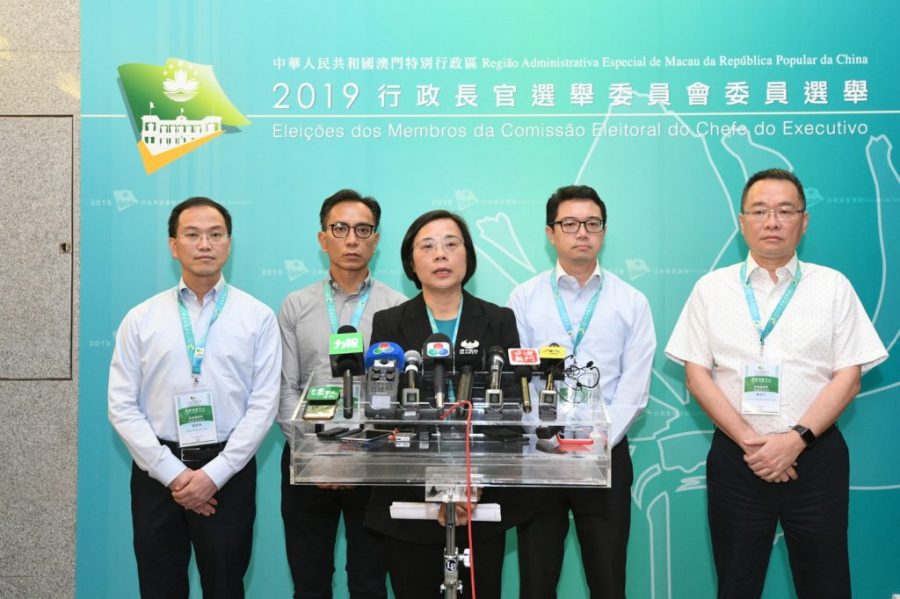A total of 5,001 voters representing over 500 associations elected 344 members of the 400-member Chief Executive Election Committee among 350 candidates – just six more than the number of seats available.
Addressing a press briefing at the Public Administration Building in Rua do Campo last night, Chief Executive Electoral Affairs Commission President Song Man Lei noted that the voter turnout of 87.2 percent in yesterday’s election was higher than the one of 82.69 percent five years ago.
A total of 5,735 voters had registered for yesterday’s secret ballot.
Song said that according to the initial results of the election, 94.84 percent of the votes cast (4,743) were valid, with 28 ballots left blank and 230 deemed invalid.
Voting took place from 9 a.m. to 6 p.m. at three polling stations – at the Macau Polytechnic Institute’s (IPM) Sports Stadium in Zape, the nearby Macau Forum complex, and the Luso-Chinese Vocational and Technical School in Areia Preta district.
In last night’s press briefing, Song said that the high voter turnout showed the high support and participation by the electorate and meant that the current election system had been “accepted” by civil society.
The chief executive election is slated to be held on August 25, government-owned broadcaster TDM reported yesterday, citing unnamed sources close to the election process.
Ho Iat Seng
Legislative Assembly (AL) President Ho Iat Seng, 62, announced his decision to run for chief executive in April. Earlier this month, two more residents announced their possible runs for chief executive – Leung Kuok Chao, who heads an investment consultancy, and Hoi Weng Chong, a well-known protester widely known in Cantonese as “the Man in Red”.
According to the Chief Executive Election Law, the 400-member, four-sector Chief Executive Election Committee comprises 120 members representing the first sector (comprising the industrial, commercial and financial segments), 115 members representing the second sector (comprising the cultural, educational, professional and sports segments), 115 members representing the third sector (comprising the labour, social services and religious segments), and 50 members representing the fourth sector, which comprises: 1) 22 representatives chosen from among the city’s lawmakers; 2) the 12 local deputies to the National People’s Congress (NPC); 3) 14 representatives chosen from among local deputies to the National Committee of the Chinese People’s Political Consultative Conference (CPPCC); and 4) two representatives chosen from among members of the city’s municipal organs (Municipal Affairs Bureau).
Macau’s legislature has 33 members. There are 12 Macau deputies to the NPC, while there are 37 Macau members of the CPPCC National Committee.
According to the Chief Executive Election Law, 344 seats – 120 seats from the first sector, 26 from the cultural segment, 29 from the educational segment, 43 from the professional segment, 17 from the sports segment, 59 from the labour segment, and 50 from the social services segment – were up for grabs yesterday in the election of the members of the Chief Executive Election Committee.
According to previous announcements by the Chief Executive Electoral Affairs Commission, 5,735 voters selected by 569 associations from the first sector and six segments were yesterday eligible to vote in this year’s election for the Chief Executive Election Committee.
Concerning the remaining 56 members of the committee – whose seats were not up for grabs in yesterday’s election for the Chief Executive Election Committee, the 12 local NPC deputies are ex officio members. The 22 representatives from the city’s lawmakers, the 14 representatives from the Macau members of the CPPCC National Committee, and the two representatives from members of the city’s municipal organs, are to be chosen from among their respective peers, according to the Chief Executive Election Law. The six members from the religious segment on the committee are chosen among the city’s main religions – Buddhism, Catholicism, Protestantism and Taoism.
There were a total of 350 candidates competing for the 344 seats up for grabs in yesterday’s election for the Chief Executive Election Committee. The educational and labour segments were the only ones where the number of seats available and the number of candidates were not identical. In the educational segment, there were two more candidates than seats at stake. In the labour segment, the number of candidates exceeded the number of seats available by four.
Of the first sector and the six segments whose seats were up for grabs in yesterday’s election, the labour segment recorded the highest turnout, reaching 94.87 percent, while the lowest was the cultural segment at 75.61 percent. The turnout was 90.5 percent in the professional segment, 89.97 percent in the first sector, 86.74 percent in the educational segment, 86.46 percent in the social services segment, and 79.5 percent in the sports segment.
Rita Santos not elected
According to the initial results of the election released by the Chief Executive Electoral Affairs Commission last night, the four candidates in the labour segment who were not elected – receiving the least number of votes – were Lam Cheong U (446 votes), Wong Hong Fai (294 votes), Rita Santos (285 votes) and Tang Sio Fong (273 votes). The two candidates in the educational segment who were not elected were Lei Kit U (121 votes) and Leong Cheng Ha (94 votes). Lam is a senior member of the influential Macau Federation of Trade Unions (Gung Luen), while Santos, a former lawmaker and senior government official, is the president of the general assembly of the influential Macau Civil Servants Association (ATFPM).
The Standing Committee of the National People’s Congress (NPC) in Beijing passed a decision on April 23 to approve Ho’s request to resign from the nation’s top legislature, which cleared the way for his bid for Macau’s chief executive. Consequently, there are currently 11 Macau deputies to the NPC at the moment.
Local businessman Kevin Ho King Lun is the first-ranked alternate NPC deputy from Macau. Kevin Ho can join the Macau Chief Executive Election Committee up to three days before the August 25 polling day, according to previous media reports, if his definite appointment to the NPC has been formalised by then.
Meanwhile, the 14 representatives from the Macau members of the CPPCC National Committee were chosen from among their peers during a closed-door meeting at the San Chok Un Guesthouse (New Bamboo Mansion) on Penha Hill yesterday. The 14 representatives for members of the Chief Executive Election Committee include Macau’s first chief executive Edmund Ho Hau Wah, a vice-chairman of the CPPCC National Committee, former secretary for Social Affairs and Culture Cheong U, prominent businessmen and former lawmakers Chan Meng Kam and David Chow Kam Fai, prominent businessman Liu Chak Wan, Melco Resorts & Entertainment Chairman and CEO Lawrence Ho Yau Lung, and Macau Federation of Trade Unions Chairman Chan Kam Meng.
As only two members of the Municipal Affairs Bureau applied to be members of the Chief Executive Election Committee, the bureau did not carry out an election to choose the two representatives for the committee, and submitted the list to the Chief Executive Electoral Affairs Commission late last month, according to an IAM statement at that time.
As only 22 lawmakers applied to be members of the Chief Executive Election Committee, the Legislative Assembly did not hold an election to choose the 22 representatives for the committee, and had submitted the list to the Chief Executive Electoral Affairs Commission in April, Song told reporters at that time.






